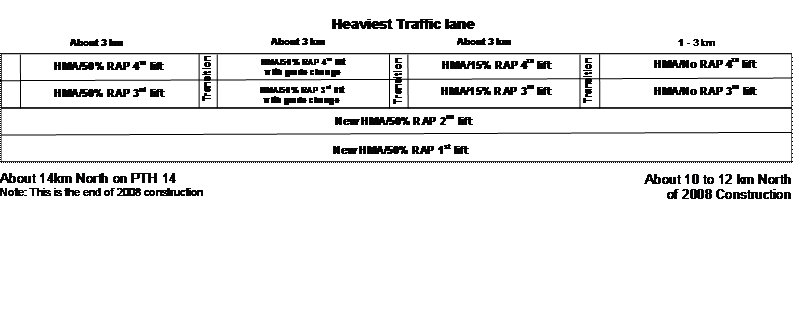|
New Manitoba pavement sites will give the ARC an unprecedented look at recycled and warm-mix asphalt performance The ARC and Manitoba Infrastructure & Transportation are preparing to construct two new comparative pavement performance sites in Manitoba, Canada. The first site is on provincial highway 14 between Plum Coulee and Winkler. The project involves milling 25 mm of the existing 100 mm pavement, using the recycled asphalt pavement (RAP) in the first 50 mm lift of new construction with three warm-mix additives and a conventional hot-mix control section, and a surface 50 mm lift using virgin materials with the warm-mix additives and hot-mix control section. The RAP content of the first lift will be approximately 30 percent. The total project length is about 14 km (8.7 miles), with about 3 km (1.75 miles) of each of the warm-mix additives (Sasobit, Advera, and Evotherm DAT) and the hot-mix section. The ARC and Manitoba I&T will conduct material property testing of the RAP, aggregate, and asphalt and formulate mix designs for the 30% RAP lower lift and the virgin top lift materials. The data from the materials and mixes will determine the recommended placement temperatures of the warm-mix materials. If laboratory data on the control hot-mix indicates that lower placement temperatures are possible, an additional test section may be included as a side-by-side comparison with the hot mix placed at normal mixing and compaction temperatures. Prior to construction, the ARC and Manitoba I&T identified locations for performance monitoring sections and conducted distress surveys of those areas so the influence of existing pavement distress can be evaluated on the new materials. The second comparative pavement performance site is on provincial highway 8 between Gimli and Hnausa. The total project length is about 28 km (17 miles), with the ARC comparative pavement site accounting for 14 km (8.7 miles) of the project. The existing pavement is being recycled using a ratio of 50% RAP and 50% new material in the two bottom 50 mm lifts. The ARC sections will be constructed over the 50% RAP material, using two 50 mm lifts with conventional hot-mix, 15% RAP, and 50% RAP, with no grade change for the new asphalt and 50% RAP with a grade change. Western Research Institute is leading the field construction of the comparative sections, and the University of Nevada, Reno and University of Wisconsin, Madison will perform the pre-construction mix and design. Construction of both sites is expected to begin in September. ARC
|

|
Asphalt Research Correspondent |
